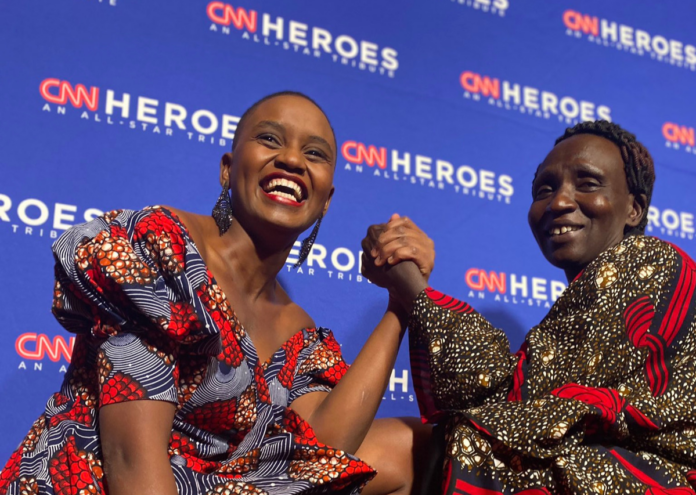Nelly Cheboi, who in 2019 quit a lucrative software engineering job in Chicago to create computer labs for Kenyan school children, is the 2022 CNN Hero of the Year.
Online voters selected her from among this year’s Top 10 CNN Heroes.
Cheboi’s nonprofit, TechLit Africa, has provided thousands of students across rural Kenya with access to donated, upcycled computers, and the chance at a brighter future.
Cheboi accepted the award with her mother, who she said “worked really hard to educate us.”
At the beginning of her acceptance speech, Cheboi and her mother sang a song onstage that she explained had a special meaning when she was growing up.
As CNN Hero of the Year, Cheboi will receive Sh. 12.3 million ($100,000) to expand her work. She and the other top 10 CNN Heroes honored at Sunday’s gala all receive a $10,000 cash award.
For the first time, additional grants, organizational training and support from The Elevate Prize Foundation through a new collaboration with CNN Heroes.
Nelly will also be named an Elevate Prize winner, which comes with a Sh. 36.9 million ($300,000) grant and additional support worth $200,000 for her nonprofit.
“The world is your oyster when you are educated,” she proudly said.
Video: Nelly Cheboi speech after being crowned CNN Hero of the Year
Cheboi grew up in poverty in Mogotio, a rural township in Kenya.
“I know the pain of poverty,” said Cheboi, 29.
“I never forgot what it was like with my stomach churning because of hunger at night.”
A hard-working student, Cheboi received a full scholarship to Augustana College in Illinois in 2012. She began her studies there with almost no experience with computers, handwriting papers and struggling to transcribe them onto a laptop.
Everything changed in her junior year, though, when Cheboi took a programming course required for her mathematics major.
“When I discovered computer science, I just fell in love with it. I knew that this is something that I wanted to do as my career, and also bring it to my community,” she told CNN.
Many basic computer skills were still a steep learning curve, however. Cheboi remembers having to practice touch-typing for six months before she could pass a coding interview. Touch-typing is a skill that is now a core part of the TechLit curriculum.
“I feel so accomplished seeing kids that are 7 years old touch-typing, knowing that I just learned how to touch-type less than five years ago,” she said.
Once she had begun working in the software industry, Cheboi soon realized the extent of which computers were being thrown away as companies upgraded their technology infrastructure.
“We have kids here (in Kenya), myself included, back in the day, who don’t even know what a computer is,” she said.
So, in 2018, she began transporting donated computers back to Kenya, in her personal luggage, handling customs fees and taxes herself.
READ: Nelly Cheboi: How software engineering made 29-year-old a millionaire
“At one point, I was bringing 44 computers, and I paid more for the luggage than I did for the air ticket,” she said.
A year later, she co-founded TechLit Africa with a fellow software engineer after both quit their jobs. The nonprofit accepts computer donations from companies, universities and individuals.
The hardware is wiped and refurbished before it’s shipped to Kenya. There, it’s distributed to partner schools in rural communities, where students ages 4 to 12 receive daily classes and frequent opportunities to learn from professionals, gaining skills that will help improve their education and better prepare them for future jobs.
“We have people who own a specific skill coming in and are just inspiring the kids (with) music production, video production, coding, personal branding,” Cheboi said.
“They can go from doing a remote class with NASA on education to music production.”
The organization currently serves 10 schools; within the next year, Cheboi hopes to be partnered with 100 more.
“My hope is that when the first TechLit kids graduate high school, they’re able to get a job online because they will know how to code, they will know how to do graphic design, they will know how to do marketing,” Cheboi said.
“The world is your oyster when you are educated. By bringing the resources, by bringing these skills, we are opening up the world to them.”








